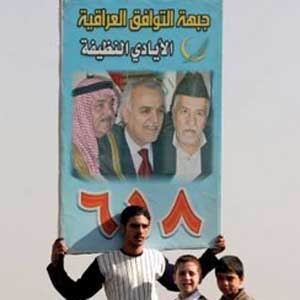The U.S.’s tricks to win Iraq’s Sunnis

12/21/2005 8:30:00 PM GMT
Sunni Iraqi Accord Front strongly rejected initial election results
The United States rewarded IRAQ's Sunnis for taking part in last week’s parliamentary elections by freeing former members of SADDAM HUSSEIN's regime, including two women allegedly accused of making biological weapons; Mrs. Anthrax and Dr. Germ. According to an article on France’s Le Figaro, Washington’s tactic might succeed in keeping the Sunnis, who resist the foreign occupation of their country, busy with the political process.
The American gesture is purely political. Several officials of SADDAM HUSSEIN's former regime were released a day after Thursday’s poll, which saw a strong turnout among the Sunnis, who largely boycotted last year’s elections. The U.S. military said it freed eight officials, but an Iraqi legal official said 24 SADDAM aides were released, including Dr Huda Salih Mahdi Ammash (Mrs. Anthrax) and Dr Rihab Rashid Taha (Dr. Germ). Others included former Transportation Secretary Ahmad Mourtada and former Secretary of Higher Education, Houman Abdel Khaliq. Some of the officials were allowed to leave Iraq.
Correspondents say the former officials were released after the U.S. army struck a pre-election deal with the Iraqi government. Lieutenant Colonel Barry Johnson, a U.S. army spokesman said: "They were released as part of an ongoing process for many months in full consultation with the Iraqi government”. The spokesman also said that the officials were freed after they were deemed to no longer present a security threat. “They had no other information useful to us,” he was quoted by AFP as saying. However, American forces in IRAQ say that “Dr. Germ” and “Mrs. Anthrax” were freed mainly because the U.S. failed to find weapons of mass destruction in the war-torn country, the Americans’ false justification for the INVASION.
This act of leniency was aimed at boosting Sunnis’ role in the political process in IRAQ, which started with the legislative election. Democratic Senator Joe Biden, [ranking] member of the American Senate's Foreign Relation Committee, says, along with others, that this will be the main challenge over the next six months. He believes that the international community must step up pressure on Sunni Arabs to reach a compromise on amending the constitution in the next four months.
Political analysts say that if Iraqi leaders don’t reach a consensus on federalism, the main reason for Sunnis’ objection, nothing could ever unite Iraq’s Shias, Kurds, and Sunnis. The most important move now is to begin a national reconciliation movement, which was discussed at a Cairo summit last month. However, the road to peace is too bumpy. Sunnis, who complain of abuses by members of Shia-dominated security forces, also want to have their own soldiers to secure their areas.
Other Arab states are also afraid of a Shia-controlled IRAQ, such as Egypt and Saudi Arabia, who also want Sunnis to play a greater role in the country‘s politics. "The Saudis have invited us to hold an International Conference on Baghdad,” affirms journalist Kais al-Azawi, who support the nationalist movement. According to him: "the next coalition government must encompass all political orientations" in order to reach an agreement.
Nearly three years after the U.S.-led invasion, Iraq now is entering a transitional stage. Although differences haven’t been resolved, the country seems to be more willing to accept diplomatic solutions. Some Iraqi resistance groups declared a truce on election day, while others protected polling stations in western Iraq. The resistance now seem to be more concerned with its political agenda than with fighting the occupation.
However, the Sunnis were again enraged following the release of initial election results in Baghdad, which showed that the Shia-led United Iraqi Alliance won 58% of the vote, while the Sunni Iraqi Accord Front only took 18.6%. The secular coalition of former Prime Minister IYAD ALLAWI came third. The electoral commission says that final results wouldn’t be available before the end of the month. But Sunnis strongly rejected the partial results, and threatened to halt the formation of new government if they were not changed. "We will not remain with our arms crossed and we will not abandon those who voted for us," said Khalaf al-Ulayyan, leader of the Iraqi National Dialogue Council.
The healing process now seems to depend on more gestures in favor of the Sunnis, bearing in mind their power over Iraqi resistance fighters. One proof is the public "thank you" from a senior Sunni leader to Iraqi resistance fighters for halting attacks on voting day.
Link Here




0 Comments:
Post a Comment
<< Home